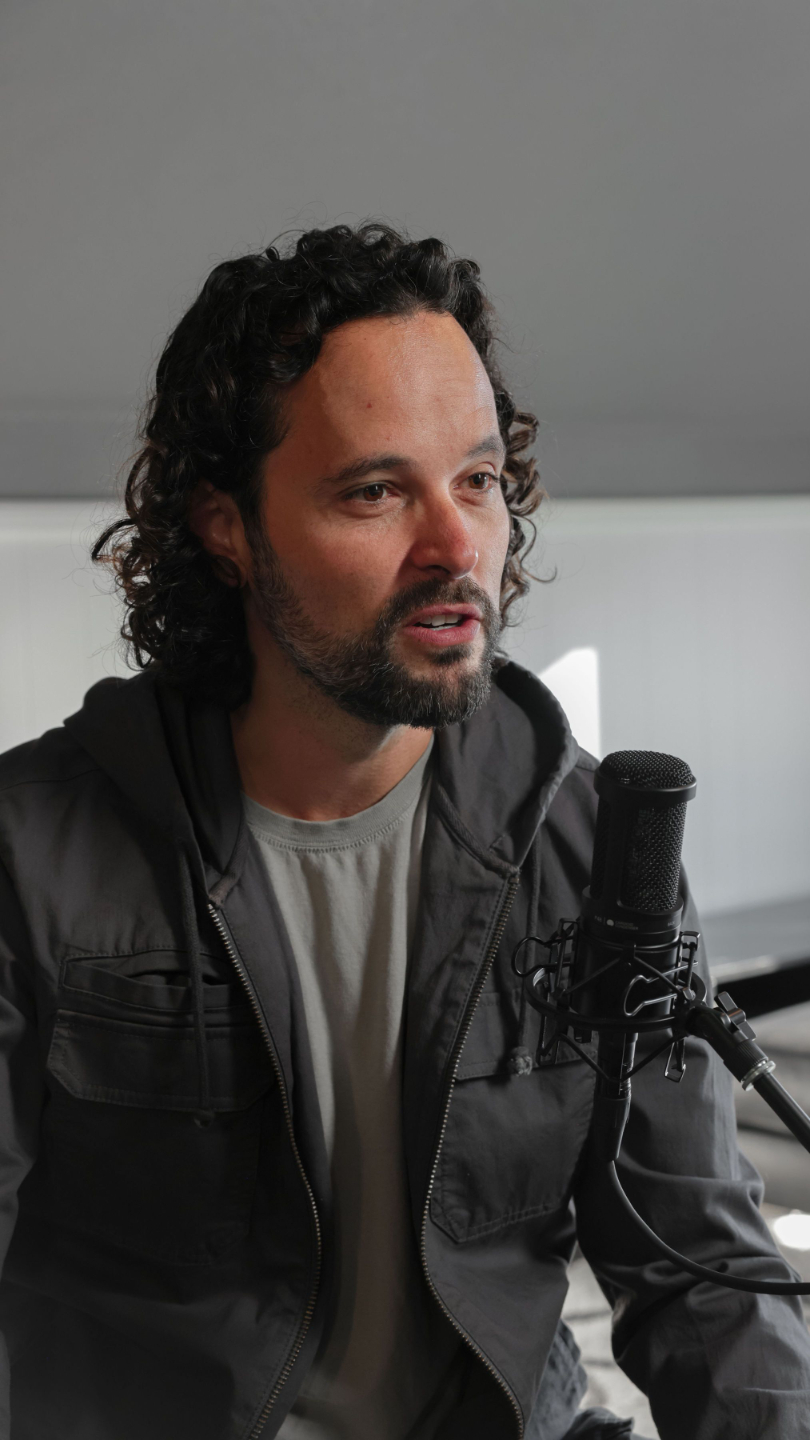The Better Husband’s Guide to Listening: A 3-Step Practice
When You’re Listening… But Not Really
I want you to picture this. You're sitting across from your wife. She's telling you something that matters to her, maybe about her day, maybe about how she's been feeling lately. You know, it's important. You can tell by the way she's talking, the look in her eyes, the weight in her voice, and what's happening in your head.
You're scrambling to figure out what to say. You're thinking, what does she want from me? Right now? You're trying to come up with something smart, supportive, thoughtful, anything that will help move the conversation forward. And maybe she finishes her sentence and you nod, you say something back. But deep down you both know it wasn't the thing that was needed at the moment because you weren't really there.
You weren't listening to understand. You were listening to respond. That's what we're talking about today, because this right here, how you show up when she's talking, especially when she's sharing something important to her, is one of the most important skills you can build in your marriage. And yes, I said skill. Listening isn't just about letting her talk and waiting for your turn.
Real listening. Takes more from you. More presence, more discipline, more attention, more intention. And in this episode, I'm going to teach you what that actually looks like. We're gonna talk about why most men struggle to listen in a way that creates connection. What listening to understand really means a simple, repeatable practice you can try this week and what to do when you feel like you are the one who isn't being heard.
So even if you've struggled with this before. Even if you think you're already a good listener, even if emotional conversations make you feel a little lost, this episode is for you. Stick around. You don't wanna miss this one.
Welcome to Better Husband, the podcast that helps you answer the question, how can I be a better husband? I'm Angelo Santiago, a men's marriage and relationship coach, and every week I bring you practical insights to help you strengthen your marriage and become the best husband you can be.
Three Moments I Blew It
So let me walk you through a few moments from my own marriage that I've had to face, and maybe just maybe you'll recognize yourself in some of them.
Here's the first one. I had just wrapped up a full day of work. I came outta my office, walked into the kitchen, and my wife started talking. She was catching me up on something from earlier, something that mattered to her, a conversation she had, something that had emotional weight, and I was standing there nodding, smiling.
It seemed like I was listening, but I wasn't. In my head, I was still inside the tabs I had opened from work. I was thinking about the podcast idea that I hadn't written down the client. I needed to follow up with the one email that had slipped through the cracks. My body was there, but my mind was somewhere completely different.
And when she stopped talking, I said something, something polite, something safe, but it didn't go well. I wasn't really there. I wasn't connected to her, and I could feel her sense that too. Here's the second one. My wife was sharing something vulnerable. She was emotional, she was really sad. And as she spoke, my brain went into high alert.
I started scanning for the solutions, running the calculations, like what's the right thing to say? Or How do I fix this? What does she need from me right now so I don't make it worse? And I was so busy trying to figure out what to say, that I stopped actually hearing what she was saying. I wasn't with her in that moment.
I was trying to manage the moment because I didn't know how to just stay there with her and her emotions to really get it. Here's the third one. She asked me if I could take our son to a friend's birthday party over the weekend so she could have a couple hours to herself.
I could tell she really needed it. She had been carrying a lot mentally, emotionally, physically, and before I could stop myself, I was already tallying in my head, well, I've done this and this and this already this week, or does she even see everything I'm doing or why does it always feel like I'm the one adjusting?
I didn't say any of that out loud, but something about me shifted. My posture, my tone, the way I looked at her, I probably sighed, and she felt it. She felt the wall go up. She felt the resistance. And in that moment I wasn't thinking about what she was really asking. She wasn't just making a request, she was expressing a need.
She was saying, I'm stretched thin. I need a little space to come back to myself. And what I missed because I wasn't truly listening, was that this was my opportunity not just to say yes, but to support her, to respond with generosity, to take something off her plate. And if I had been listening through that lens, if I had paused, taken a breath, and really tried to understand what was under her words, I would've seen it.
Giving her those couple of hours away wasn't just good for her. It would've been good for me too, good for our son, good for our marriage, but my listening was shut down because I was in defensive mode. I made it about fairness, about me, about how much I, I had already done. I'm sharing these stories because I've seen how easy it's to slip into those patterns to be so focused on your next move that you miss the moment right in front of you.
I've done it and I've had to learn how to catch myself, come back and start listening differently. So if you've had these moments like this too, if you've walked away from a conversation thinking, I should've shown up better there, then let me help you out. Because learning how to truly listen isn't just a nice to have in a marriage.
It's a foundational skill, and it's one of the fastest ways to improve the entire tone of your relationship.
The Reason Most Men Don’t Listen Well
But why is listening so hard for so many men? Let's start here because most of the men I work with are men who care deeply about their wives, their kids, and their marriages. Men who don't want to mess this up, but when their partner starts talking, especially when it's emotional or vulnerable or tense, they lock up or they speed up.
Or they start planning their next move. I've mentioned this on the podcast before, but if you haven't heard it, most of us have been trained our whole lives to act, to fix, to solve, to lead with answers. And that training works in certain places. You've probably built a career on it. Maybe you manage people, you lead teams, solve problems under pressure, and when someone comes to you with an issue, your brain kicks in and goes, okay.
What's the move here? What do I need to say? How do I get out in front of this? But here's the problem. When you bring that same mindset into your marriage, it doesn't build connection. It shuts it down. Because now instead of listening to what your wife is really saying, you're listening for what you think she wants you to say.
You're evaluating her emotions, like data points. You're trying to line up your next sentence while she's still in the middle of hers. You're checking your supportive husband box without actually being with her. And here's what you need to know about this. She feels it. You might not even notice it's happening, but something's off and she knows it, and it leaves her feeling alone in the conversation.
Now, maybe you're thinking, but I'm doing my best. I am listening and I believe you. But there's a difference between hearing someone's words and being present to their experience between giving a response and creating a moment where she feels really seen and heard. Real listening requires something from you slowing down, noticing what's happening inside you as she speaks.
Choosing to stay receptive and open instead of jumping into your next point. That might not come naturally, but it can be learned. And when you do learn it, you'll both notice something start to change. She'll feel heard, she'll open up more. She'll trust that you actually care and you'll stop walking away from conversations thinking, I guess I blew that again.
What the Science Says About Listening and Connection
Now if you're skeptical, if part of you is thinking, this sounds good in theory, but wants some proof, let me give you some research to back it up. A study published in the Journal of Social and Personal Relationships found that when couples felt genuinely listened to during difficult conversations, it improved not just the moment but the relationship as a whole.
What they found was that when one partner listened with real presence, when they really heard what the other person was trying to say and showed it that couple experience, stronger connection, less defensiveness, and a faster return to feeling close again, and this wasn't some drawn out therapy experiment.
It was day-to-day stuff like arguments, tense conversations. One person making a bid for connection, and the other person choosing to really show up for it. There's also research from UCLA showing that when someone listens with genuine care without interrupting or jumping into solve, it actually triggers a chemical response.
Your brain releases oxytocin, the same hormone involved in trust, bonding and intimacy. Let that sink in your ability to listen. To just be there without fixing can literally create the connections for trust and emotional safety in your marriage. Your body knows it. Hers does too. Another finding. When people feel emotionally dismissed, they don't just get annoyed, they withdraw, they stop bringing things up, they stop sharing, and that emotional shutdown is one of the biggest predictors of long-term disconnection in couples.
So what does all this mean for you? It means that this isn't about learning how to sound more supportive. It's about learning how to be more connected through your presence, through your attention, through your willingness to stay in the moment with her. You just need to slow down enough to listen for what matters.
And now that you know why this skill matters so much, both emotionally and physiologically, let me show you exactly how to practice it because this is something you can start doing today.
A Simple 3-Step Method to Truly Listen and Stay Present
Let's get into the practice.
So let me show you what I started practicing in my own marriage and what I teach men I work with. When my wife was sharing something with me, especially something that mattered, I began to focus on one thing, slow down and stay with her, get outta my head, get out of strategy or fix it mode and just be with her.
What helped me was having a simple structure to follow, just a guide I could return to when I felt that old part of me kicking in, trying to solve, or escape. Here's what I use, three parts and I still come back to them all the time. Here's how it works. Step one, repeat back what you just heard, not word for word.
Don't worry about having to get it exactly right, but reflect the essence of what you just said. What you actually heard. Something like, so you're saying you felt alone at the party because I was off talking with everyone else, or you were hoping I'd step in with the kids sooner and it hurt that I didn't.
This first step shows that you're not just letting her words pass through you. You're taking them in, you're processing them, you're sending something back. You're letting her know, I'm paying attention. Just reflect what you heard and always finish with, did I get that right? If you did, great, you're ready to move on to step two.
But if not, ask her what did you miss? Or is there something she needs to add? Then if so, repeat step one again. Repeat what you heard and finish with, did I get that right? I.
Now once you do, here's step two. Name the feeling. This is where most men freeze because now you're stepping into empathy. You're identifying the emotional experience, not just the facts. That must have felt disappointing. That sounds overwhelming. That probably made you feel alone. If you don't know what she's feeling, guess humbly or ask her.
You can say, I'm not totally sure if I'm getting this right, but it sounds like you felt really let down. Again, you can ask, did I get that right? You're not trying to play therapist here. You're just trying to connect. You're doing your best to support her and tend to her. That's what a partner is for. And then step three, ask a gentle follow up.
This is what keeps the door open. A lot of guys stop too early. They say, I get it, or, I'm sorry you felt that way, or, that must have been hard. And then immediately pivot the conversation. But if you want your wife to feel truly heard, give her room to keep sharing. Try something like, is there more you wanna say about that?
Or what was that like for you? Or is there anything you need from me right now? You're not doing this to keep the conversation going endlessly. You're doing it to show her that you're not just tolerating what she's saying, you're actually interested. You actually care. You're invested in understanding what this experience was like for her.
You're staying curious and sometimes that last follow up is what allows her to soften, to open up and to trust that this is a safe moment. Now let me pause here and say something directly. The first time you try this, it might feel a little awkward. You might feel like you're way off. You might be unsure if you're doing it right and that's okay.
Don't rush to get it right. Don't rush to move on. Just stay with it. It's all about showing up differently in a moment that used to shut you down or trigger you into defending Reflect, name, ask. It's simple. I. But it's not easy, especially when your nervous system is buzzing and your old habits are telling you to protect yourself.
Fix something or get it over with. But if you can stay grounded, if you can keep that posture of curiosity and care, you're going to create a very different kind of conversation. One that starts to reshape how your wife experiences you when things get hard.
How Real Listening Changes Your Marriage
So why does this matter so much? Why are we spending a whole episode on listening? Well, because for a lot of couples, maybe yours too, the issue isn't that you're not having enough conversation. The issues that the conversations you are having aren't creating connection. You can talk about logistics all day.
You can make. Plans, exchange updates. Figure out who's doing pickup or paying the next bill. But when it comes to emotional connection, when it comes to the kind of conversations that build intimacy, if there's no real listening, it doesn't matter how many words are exchanged, it won't feel close. And that's what this is really about.
When your partner shares something with you, especially something that carries emotional weight and you listen with care, something changes. She stops feeling like she has to do it alone. She stops feeling like she has to hit you over the head with a baseball bat to get you to pay attention to her experience, and she relaxes because she feels you with her.
That's what listening does. That's what creates connection. Not the perfect response, not the best advice, not the right timing. It's your presence and openness. And here's the thing, when you start listening this way, not just occasionally, but consistently, you'll notice that everything else starts to get easier.
Your conversations will feel less tense. Small issues won't escalate as fast. You won't be stuck in the same arguments on repeat and the intimacy between you, emotional, physical, even spiritual, starts to grow. Listening this way opens your marriage up to connection and repair, and that's why this skill is one of the most powerful things you can do to strengthen your marriage.
What to Do When You Don't Feel Heard
Now, let's talk about something I hear from a lot of men. Okay, I'm listening this way. I'm showing up, but I don't feel like she hears me when it's my turn. That's real. So let's talk about it.
You've been listening, you've been showing up differently, you're slowing down, trying to understand, asking better questions, and still you feel like you are not being heard. Maybe you bring something up and it gets brushed aside. Maybe you share how you feel and the response feels cold or even critical.
Maybe you open up and expect connection and it just doesn't come. And when that happens over and over again, it starts to wear on you and you start wondering what's the point? And you start pulling back just a little, you stop sharing the deeper stuff. You stop bringing up things that matter, and quiet resentment starts to build.
I get it. I felt it too. There were moments in my own marriage where I was vulnerable and it felt like my wife didn't really get it or didn't care, or didn't wanna sit with what I had just put on the table or had something else more important to worry about than me.
And in those moments, here's what I noticed about myself. I wanted to retreat, or I wanted to push back. It's a very human response, and it's also one of the most dangerous patterns we can fall into because the moment you start retaliating, even if it's quiet or internal, we stepped into a losing strategy.
Now we're withdrawing, punishing, withholding, and you can't build connection while protecting yourself at the same time. So what do you do when you don't feel heard? You name it gently, clearly, relationally. Not to shame her or to guilt her or to prove a point, but to give her the same invitation you're giving yourself to step in, to stay connected, to repair.
What's been missed. Lemme give you a tool for that. It's one I teach inside Better Husband Academy, and it's also available in the Better Husband Toolkit. It's called the Feedback Wheel. It's a simple step-by-step tool for sharing your experience in a way that lowers defensiveness and increases clarity.
Here's how it works. In short one, state the facts. When I was sharing about that conversation with my boss, you started looking at your phone. Number two, share the feeling. I felt dismissed, sad, and a little angry. Number three, tell her the story you made up about it. The story I made up was that my problems don't matter to you and you don't care about me.
And number four, make a request as a favor to me when I'm sharing something vulnerable with you. Would you put your phone down and really be with me in those moments? And then. Let go of outcome. Using the feedback wheel doesn't guarantee the response you want, but it gives you the best shot at being understood without escalating tension or triggering a shutdown.
And more importantly, it helps you stay in your integrity because when you can express your own need without attacking or collapsing, you're modeling exactly the kind of communication you want to receive. If you want that tool, go grab it right [email protected]. It's in there, along with other tools that help you navigate moments like this with presence, clarity, and relational leadership.
Here's the bottom line. You deserve to feel heard too, but don't wait to receive it before you offer it. Lead the way.
Your One Practice This Week
So here's what I want you to do this week one time, one real moment, when your wife is sharing something with you. Anything with emotional weight, anything that matters to her.
Practice the deep listening skill I shared with you in this episode. If you need a reminder, here it is. Step one. Repeat what you heard. Not the whole thing, not every word, just the essence of what she shared. Hit the main points clearly and completely. Let her know you were paying attention. Then ask, did I get that right?
Step two, name the emotion. Guess if you're not sure, and if you're totally lost, ask her. How did that make you feel? Step three, keep the door open to connection. Ask if there's more. It might sound like, is there more you wanna share? Or what was that like for you? Then stay with her. Don't fix, don't pivot into your own story.
Just stay there. Let her feel the silence. Let her feel your presence. Let her feel that you are with her. If she asks for your opinion or wants to know what you think, great, you'll be ready. But don't rush ahead. That moment of stillness. Of space. That's where the trust lives. I'm serious about this. This is a new skill, so you need to practice it.
You're building a new reflex, a new response, one that slows you down, one that turns you towards her instead of away. Just do it once. That's all I'm asking, because if you do it once and you stay with it, you'll know what it feels like to shift the energy between you and you'll want to do it again.
Reflect on These Questions and Take Action
Here are a few reflection questions to sit with after you try it. When she was talking, where did my mind want to go? Could I stay with her? How did she respond when I reflected her experience? Instead of reacting, what was it like to name a feeling out loud, especially if I wasn't totally sure what changed, if anything, in how I felt after the conversation?
Now, all those questions are listed for you in the show notes. I want you to write your answers down or just take five minutes at night and think about them.
If you truly want to become a man who brings calm care and connection into his marriage, if you truly want to be a better husband, this is how you start.
Thanks for being here today and for doing this work. Thank you for making the choices that lead to change in your marriage. Listening is one of those choices. So go practice, show up. Let her feel you with her. And if you want more tools to keep building this foundation, including the feedback wheel I mentioned earlier, go to better husband toolkit.com. It's there waiting for you. I'm Angelo Santiago. This is Better Husband, and I'll see you on the next one.







